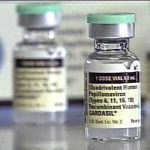2007年VOA标准英语-Scientists Face Obstacles in Vaccine Developmen(在线收听)
Washington
19 March 2007
watch Vaccine report
Some U.S. state lawmakers are fighting a mandate requiring certain vaccinations for children, saying it encourages undesirable behavior. Getting vaccinated has become a more complicated process since the 18th century, when English scientist Edward Jenner first discovered a vaccine for smallpox. VOA's Ernest Leong reports.
 |
| Cervical cancer vaccine |
But in the U.S. southern states of Florida and Texas, some politicians and parents say preteen girls should not be required to receive Gardasil, a new vaccine against cervical cancer.
One parent, Kishiam Lindsay, thinks the vaccine is a good idea. "I think it's a good vaccine, but I don't think it should be forced upon a child, either."
Gardasil protects against a sexually transmitted virus that causes cervical cancer. Those who oppose mandatory vaccination say young girls who receive the injection might be encouraged to have sex at an early age.
School board member Stephanie Kraft says the pharmaceutical company Merck is issuing the vaccine to make a quick profit. "Merck has got this on a fast track, because they stand to make a lot of money."
Despite the high price tag for new vaccines -- Gardasil would cost about $360 per child -- some medical professionals, like Dr. Peter Hotez of George Washington University, say vaccine manufacture is not profitable. "While the market [for vaccines] is very large, the commercial market is very small."
Dr. Hotez says demand for vaccines is great in developing countries, where there is a higher risk of contracting disease. "There's a particularly acute need for vaccines for developing countries, because those regions of the world tend to have a much higher disease burden, resulting from infectious diseases."
Hotez says vaccine development is an expensive process for drug manufacturers, and usually offers only modest financial returns. He says it would be much more profitable to find the next "blockbuster" drug -- something like Lipitor, the cholesterol-lowering drug that has earned many billions of dollars [for its manufacturer, Pfizer].
As a result, the number of vaccine manufacturers is declining.
"So, in fact, it turns out there are only approximately five large vaccine manufacturers worldwide, as compared to maybe 20 two decades ago," Hotez says.
To date, the greatest resource for vaccine research and development is in the philanthropic sector -- primarily the Bill and Melinda Gates Foundation.
"This is why the funding from the Bill and Melinda Gates Foundation is so critical. Because it's allowed us to actually develop a vaccine for the world's poor by creating the equivalent of a nonprofit company" said Hotez.
Part of the problem is the time it takes to develop a new vaccine -- sometimes decades, says Arthur Allen, author of a best-selling book on the history of vaccines. "The scientists who work on this [vaccines] are obsessive types, who maybe work 20 years trying to perfect a vaccine."
Vaccines are actually weakened or killed versions of a virus. Introducing the virus into the human body in a weakened form enables a person to develop resistance to it.
For this reason, Allen says vaccine development carries with it an element of risk. "One vaccine maker said he never felt safe until his vaccine had been tested on three million children. It's an awesome responsibility, to give vaccines to young children."
An awesome responsibility that is both necessary and controversial, as some scientists continue to battle illness with vaccines.